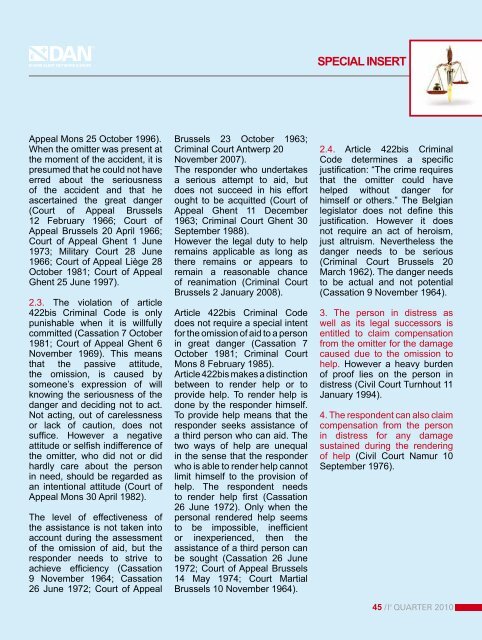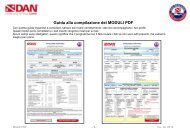Alert Diver - DAN Europe
Alert Diver - DAN Europe
Alert Diver - DAN Europe
You also want an ePaper? Increase the reach of your titles
YUMPU automatically turns print PDFs into web optimized ePapers that Google loves.
Appeal Mons 25 October 1996).<br />
When the omitter was present at<br />
the moment of the accident, it is<br />
presumed that he could not have<br />
erred about the seriousness<br />
of the accident and that he<br />
ascertained the great danger<br />
(Court of Appeal Brussels<br />
12 February 1966; Court of<br />
Appeal Brussels 20 April 1966;<br />
Court of Appeal Ghent 1 June<br />
1973; Military Court 28 June<br />
1966; Court of Appeal Liège 28<br />
October 1981; Court of Appeal<br />
Ghent 25 June 1997).<br />
2.3. The violation of article<br />
422bis Criminal Code is only<br />
punishable when it is willfully<br />
committed (Cassation 7 October<br />
1981; Court of Appeal Ghent 6<br />
November 1969). This means<br />
that the passive attitude,<br />
the omission, is caused by<br />
someone’s expression of will<br />
knowing the seriousness of the<br />
danger and deciding not to act.<br />
Not acting, out of carelessness<br />
or lack of caution, does not<br />
suffice. However a negative<br />
attitude or selfish indifference of<br />
the omitter, who did not or did<br />
hardly care about the person<br />
in need, should be regarded as<br />
an intentional attitude (Court of<br />
Appeal Mons 30 April 1982).<br />
The level of effectiveness of<br />
the assistance is not taken into<br />
account during the assessment<br />
of the omission of aid, but the<br />
responder needs to strive to<br />
achieve efficiency (Cassation<br />
9 November 1964; Cassation<br />
26 June 1972; Court of Appeal<br />
Brussels 23 October 1963;<br />
Criminal Court Antwerp 20<br />
November 2007).<br />
The responder who undertakes<br />
a serious attempt to aid, but<br />
does not succeed in his effort<br />
ought to be acquitted (Court of<br />
Appeal Ghent 11 December<br />
1963; Criminal Court Ghent 30<br />
September 1988).<br />
However the legal duty to help<br />
remains applicable as long as<br />
there remains or appears to<br />
remain a reasonable chance<br />
of reanimation (Criminal Court<br />
Brussels 2 January 2008).<br />
Article 422bis Criminal Code<br />
does not require a special intent<br />
for the omission of aid to a person<br />
in great danger (Cassation 7<br />
October 1981; Criminal Court<br />
Mons 8 February 1985).<br />
Article 422bis makes a distinction<br />
between to render help or to<br />
provide help. To render help is<br />
done by the responder himself.<br />
To provide help means that the<br />
responder seeks assistance of<br />
a third person who can aid. The<br />
two ways of help are unequal<br />
in the sense that the responder<br />
who is able to render help cannot<br />
limit himself to the provision of<br />
help. The respondent needs<br />
to render help first (Cassation<br />
26 June 1972). Only when the<br />
personal rendered help seems<br />
to be impossible, inefficient<br />
or inexperienced, then the<br />
assistance of a third person can<br />
be sought (Cassation 26 June<br />
1972; Court of Appeal Brussels<br />
14 May 1974; Court Martial<br />
Brussels 10 November 1964).<br />
SPECIAL INSERT<br />
2.4. Article 422bis Criminal<br />
Code determines a specific<br />
justification: “The crime requires<br />
that the omitter could have<br />
helped without danger for<br />
himself or others.” The Belgian<br />
legislator does not define this<br />
justification. However it does<br />
not require an act of heroism,<br />
just altruism. Nevertheless the<br />
danger needs to be serious<br />
(Criminal Court Brussels 20<br />
March 1962). The danger needs<br />
to be actual and not potential<br />
(Cassation 9 November 1964).<br />
3. The person in distress as<br />
well as its legal successors is<br />
entitled to claim compensation<br />
from the omitter for the damage<br />
caused due to the omission to<br />
help. However a heavy burden<br />
of proof lies on the person in<br />
distress (Civil Court Turnhout 11<br />
January 1994).<br />
4. The respondent can also claim<br />
compensation from the person<br />
in distress for any damage<br />
sustained during the rendering<br />
of help (Civil Court Namur 10<br />
September 1976).<br />
45 /














